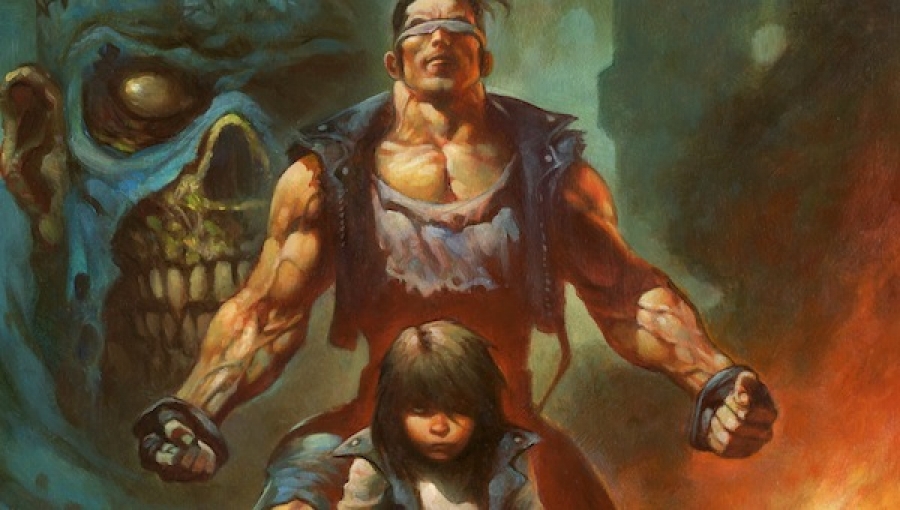The following is an interview with Dave Elliott, writer of the superhero graphic novel Sharky from Titan Books. In this interview, Fanboy Comics Managing Editor Barbra Dillon chats with Elliott about his inspiration for the book, why the superhero genre needs a change of pace when it comes to comic books, and how he manages such a demanding project schedule.
This interview was conducted on September 7, 2013.
Barbra J. Dillon, Fanboy Comics Managing Editor: Your latest graphic novel, Sharky, turns the superhero genre on its head with its irreverent tale of an otherwise normal boy transforming into a demi-god after learning that his parents are gods themselves. What inspired you to tell this story, and do you feel that the superhero genre takes itself too seriously?
Dave Elliott: The inspiration for Sharky came from Alex Horley and myself having a love for comics from the 1960s and early ’70s, particularly the work of JACK KIRBY and JOHN BUSCEMA. As we started work on it, we also started to let other influences in like FRANK FRAZETTA and ROBERT HOWARD. A little C. C. BECK crept in, as well.
Yes, I think the superhero genre does take itself too seriously, and the business of making comics reflects that. Sharky was our lone attempt to hold back the tide. We had as much success as King Canute did.
BD: Sharky is the first book of a graphic novel series. Do you have a specific number of books in mind, and how often will new volumes be released?
DE: No specific number in mind. We’ll put one out whenever we have enough material. I almost have enough for a second volume, and I’m working on some new stories now where Sharky puts together a super team of his own called MAXIMUM FORCE. I will state now that these new stories will definitely not be in the grim and gritty category.
BD: This has been quite a busy year for you, first with the release of the horror anthology Monster Massacre: Volume 1 and now the release of Sharky. Do you find it difficult to balance such a demanding workload, or does it allow you greater opportunity to create new ideas and projects?
DE: The demands of making a living in this industry demand that you constantly have new projects coming. There is no nice retirement package waiting for freelancers in this industry, so you gotta work ’till the end.
Honestly, I am having the most fun creatively than I have for years. The anthology format of Monster Massacre and A1 allows me to experiment and test new ideas. It’s the reason I’m able to get so many top creators to do work for them; they get the freedom to experiment and create stories they own and control. If they did a creator-owned mini-series for an independent, they’d have to take 6 months or more off paying assignments and most likely get no real financial return. But, doing short stories where they don’t need to stop their regular paying gigs that they can eventually collect will make them more money in the long run while still having the satisfaction of having your own property out there.
BD: Readers will know Sharky artist Alex Horley from his work with DC Comics, Dark Horse Comics, and the collectable card games World of Warcraft and Magic: The Gathering. How did you come to work together on the graphic novel, and how would you describe your creative process?
DE: That Horley just does as he’s told if he wants his daily bread and water!
Seriously, though, Alex and myself had talked so much about what we had wanted to do that by the time we started this, I knew what he wanted to draw and I did as much as possible to include those elements, so he wouldn’t get bored.
I first met Alex when he came from Italy to London to show me his portfolio. He had seen the first Monster Massacre and wanted to be in it. He got his wish and I got an amazing artist to work with.
My dream is of winning the lottery, so I can hire Alex to work with me for the rest of our lives.
BD: Lastly, what would you like to tell fans who want to learn more about Sharky and your body of work?
DE: Check out Sharky, Monster Massacre, and A1 if you remember comics that had a little soul to them. Comics should be fun, not that they have to be ‘funny’ but fun to read. That some part of it brings a little smile to your face even if it is because of something sick and twisted that did it for you. It was Alex and myself who first put zombies in superhero comics. That’s gotta be worth something, right?

